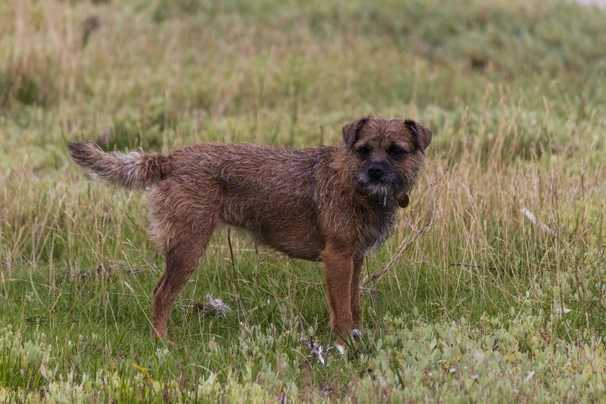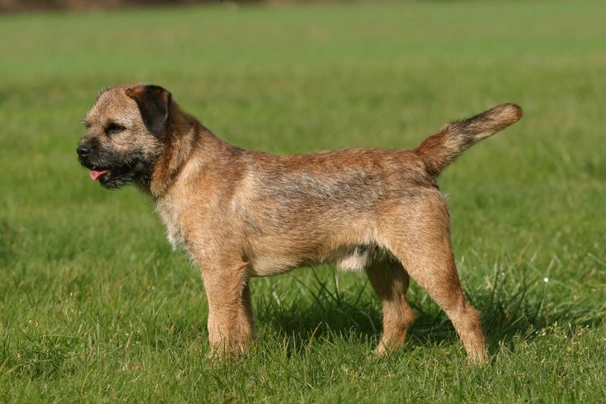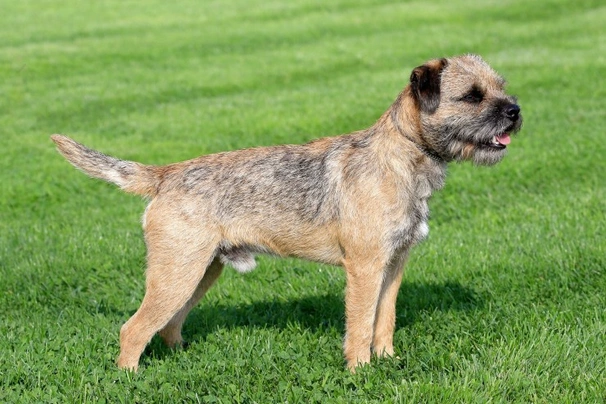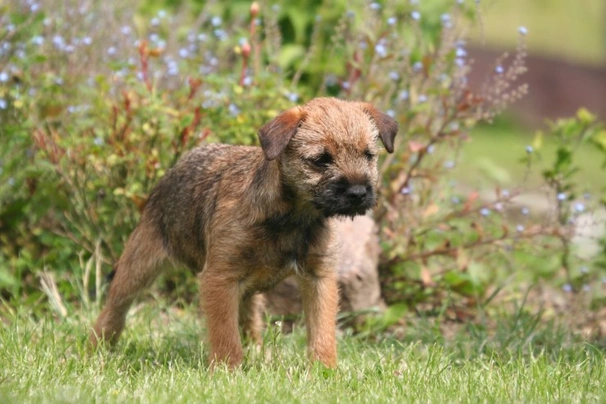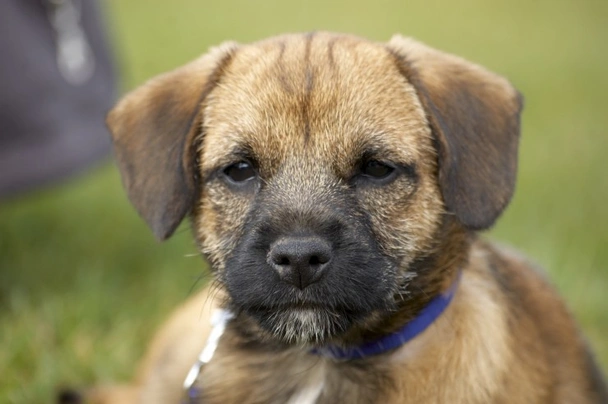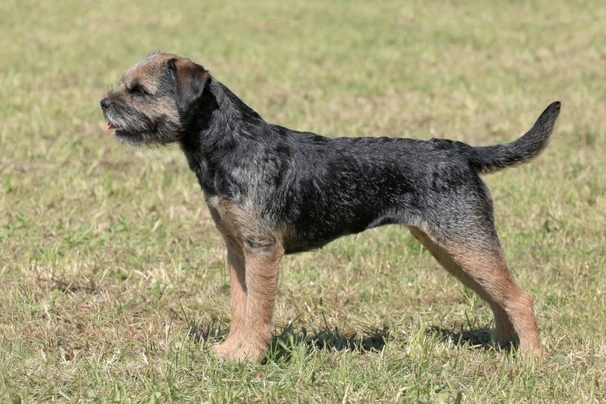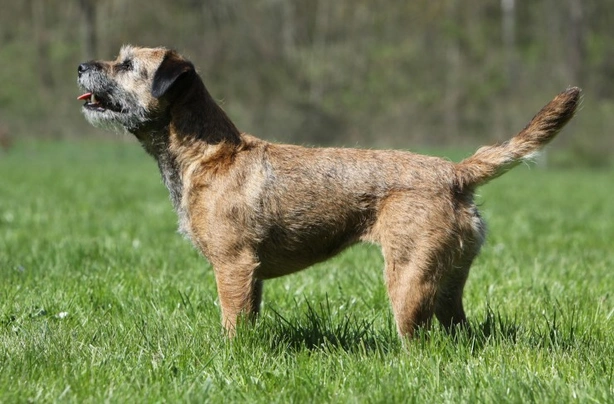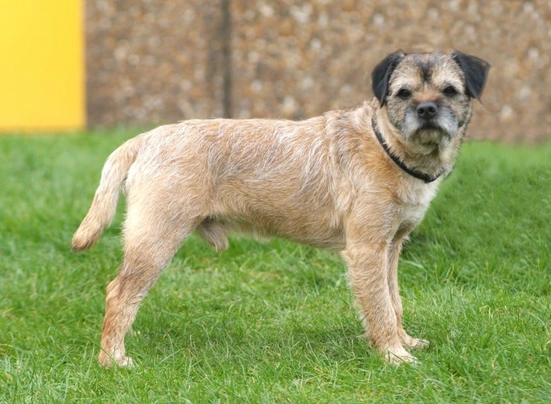Border Terrier
Pros
Cons
Introduction of the Border Terrier
Border Terriers are true working dogs in the purest sense of the term and essentially that's what they still are today. With this said they are just as happy living in a home environment being trustworthy loyal and affectionate members of a family. They have very specific characteristics which are not always welcome with everyone they meet and Border Terriers have a tremendous amount of stamina having been bred to follow horses all day long. As such they need a tremendous amount of daily exercise combined with lots of mental stimulation for them to be truly happy well-rounded terriers.
The one thing they need is to be kept busy mentally and physically otherwise boredom sets in which can lead to a Border Terrier getting up to quite a bit of mischief around the home. These attractive little dogs have been around for a long time and as their name suggests they originate from the border between Scotland and England. They boast an interesting ancestry which they share with thePatterdaleBedlingtonandDandie Dinmont Terriers. However it was only in 1920 that they were officially recognised by the Kennel Club.
History of the Border Terrier
The Border Terrier was originally called the Coquetdale Terrier or the Redesdale Terrier depending on which area they were bred. However by the end of the 1800's they were referred to as Border Terriers which many believe was because of their close association with the Border Hunt of Northumberland.
They share their ancestry with other breeds namely the Dinmont Terrier Bedlington Terrier and Patterdale Terrier. These little dogs were bred to be strong robust little terriers that were capable of coping with the bleak climate of the borders between England and Scotland. They were bred and used by local shepherds and farmers to keep the fox population under control. When foxhunting became a popular sport Border Terriers were used to chase foxes out of their lairs when they ran to ground. These little terriers were renowned for their stamina capable of following the hunt over great distances and still having the energy to continue working when the need arose. They are one of the UK's oldest native terriers with records of them dating back to the 18th Century.
It was during the 19th Century that foxhunting became a popular sport and Border Terriers proved invaluable thanks to their stamina and tenacity when it came to tracking their prey and to flush out foxes when they went to ground rather than attack and kill them.
The dogs we see today are the same as the terriers that were bred back then with many enthusiasts believing them to be the "perfect" dog both in looks and nature for the task they were bred to do in the borders between Scotland and England. Border Terriers were officially recognised as a breed by The Kennel Club in 1920 and over the years has gained in popularity to such an extent that they are among the most popular breeds in the UK achieving excellent results when competing at Championship levels too.
Interesting facts about the breed
- Is the Border Terrier a vulnerable breed? No they are among the most popular breeds in the UK
- Border Terriers were once called Coquetdale or Redesdale Terriers
- The little dog that was Lassie's sidekick called Toots was a Border Terrier
- Border Terriers excel at all sorts of canine sporting activities
- Border Terriers are gentle in a home environment but tenacious and tough in the field
- They can squeeze through the smallest of holes
- Border Terriers have coats that are referred to as “loose hides”
- They have “otter-shaped” heads
Appearance of the Border Terrier
Height at the withers: Males 33 - 40 cm Females 28 - 36 cm
Average Weight: Males 6.0 - 7.0 kg Females 5.0 - 6.5 kg
The Border Terrier is perfectly built for the job they were bred to do. They are compact sturdy and well put together terriers that boast an incredible amount of stamina. These little terriers boast very "otter-like" heads with a broadish skull and strong looking short muzzle. Border Terriers typically have black noses although flesh or liver colours are acceptable as a breed standard too.
They have keen alert eyes and a strong jaw line with a perfect bite. Their necks are well-proportioned in comparison to the rest of their bodies which are narrow and long with their ribcage being quite far back which are never too broad. They have rangy hindquarters and small feet with nicely formed thick pads. Border Terriers are long in the leg as compared to other terriers which is one of their distinguishing physical traits. Their short tail is thicker at the base tapering off at the tip which these little dogs carry high.
Border Terriers have coarse dense top coats with a close softer undercoat and they have very thick skin. When it comes to acceptable Kennel Club breed colours these are as follows:
- Blue & Tan
- Dark Grizzle
- Dark Grizzle & Tan
- Dark Red Grizzle
- Grizzle
- Grizzle & Tan
- Light Grizzle
- Red
- Red Grizzle
- Wheaten
Gait/movement
When Border Terriers move they do so with purpose having the stamina to keep going all day long without showing any tiredness. Their gait is busy and they cover a lot of ground when they need to with the minimum of effort.
Faults
The Kennel Club frowns on any exaggerations or departures from the breed standard and the seriousness of the fault would be judged on how much it affects a dog’s overall health and wellbeing as well as their ability to perform.
Male Border Terriers must have both testicles fully descended into their scrotums and it is worth noting that the size of a Border Terrier can be a little smaller or slight bigger as well as being a little taller or slightly shorter than stated in their Kennel Club breed standard which is to be used only as a guide for the breed.
Temperament of the Border Terrier
Border Terriers are not like other terrier-types to look at or in nature. Their raggedy appearance disguises well their affectionate loveable albeit independent natures with their cheeky otter-like looks. They are often described as being "energetic terriers known for their gameness" which is a very good way of describing these little dogs because they do need to be kept busy to be truly happy and well-balanced characters. Border Terriers retain their strong instinct to chase down prey and like nothing better than to be outdoors doing what they do best which is just that. With this said providing they are given enough to do and lots of physical exercise they fit in well as a family pet and thrive in a home environment.
As with other terriers and dogs in general the Border Terrier really does need to be well-socialised from a young age so they get on with other animals commonly kept as family pets and this includes cats. However if a neighbour’s cat ventures into their territory a Border Terrier would see them as "fair game" and would not be able to resist chasing a visiting cat off the property.
Border Terriers are intelligent little dogs which means they learn things quickly both the good and the "bad". They can be a little stubborn at times and if they think there is something more interesting to do they are more than likely to ignore a command and go off and do their own thing. On top of this because the Border Terrier boasts a high prey drive it's important for gardens to be made very secure because these little dogs will try to get over or under a fence when the mood takes them. They are known to be highly skilled escape artists.
Although hardy the Border Terrier is a sensitive character and responds well to positive reinforcement training. These terriers do not respond well to any harsh handling. Their training needs to start as early as possible when puppies are at their most receptive and their education must continue throughout their lives to remind them of their place in the pack which typically needs gently doing from time to time.
Border Terriers are very good at agility all thanks to their active and lively natures. This paired to the fact they love nothing more than to be kept busy means they excel at canine sporting activities like Flyball loving every minute of the attention they are given when they take part in any competitions.
Are they a good choice for first time owners?
Border Terriers although affectionate and kind by nature are not the best choice for first time dog owners because they need to be trained and socialised by people who are familiar with their specific needs bearing in mind that Border Terriers are truly working dogs which is a trait that is deeply embedded in their psyche.
What about prey drive?
Border Terriers have an extremely high prey drive and would be quick off the mark when they spot any smaller animals or pets which they would consider as fair "game". As such care should always be taken as to where and when a Border Terrier can run free off their leads when out in a public place.
What about playfulness?
Border Terriers are known to be real comedians when the mood takes them and enjoy playing lots of interactive games. They are particularly good at sporting activities which includes agility which they thoroughly enjoy more especially as it typically involves running through tunnels.
What about adaptability?
Border Terriers are adaptable little dogs but they do a whole lot better living in the country environment or in a house with a large back garden providing the fencing is ultra-secure which cannot be stressed strongly enough where these little terriers are concerned. Given that they need a tremendous amount of daily exercise and mental stimulation a Border Terrier would not be as happy living in an apartment in town or being left to their own devices for any length of time.
What about separation anxiety?
Border Terriers form strong ties with their families and owners which means they hate being left on their own for any length of time which can result in a dog suffering from separation anxiety. This can lead to a dog developing unwanted and destructive behaviours around the home.
What about excessive barking?
When unhappy or left to their own devices a Border Terrier would show their displeasure at the situation by barking incessantly which is their way of getting the attention they thrive on. With this said they can be taught not to bark unnecessarily providing this part of their education starts early and dogs are not told off too harshly when they do bark. The reason being that Border Terriers might be robust but they are sensitive by nature and therefore do not respond well to harsh words or correction.
Do Border Terriers Like Water?
Some Border Terriers like water although they are not the best "swimmers". Other dogs hate water and it would be a mistake to force a Border Terrier to take a swim because it would end up frightening them even more.
Are Border Terriers good watchdogs?
A Border Terrier would be quick to let an owner know when there are strangers around or when they are unhappy about a situation and being so tenacious and bold they are known to be good watchdogs protecting their families and properties without hesitation at all.
Intelligence / Trainability of the Border Terrier
Border Terriers are highly intelligent little dogs which means they are very easy to train when they are given the right sort of guidance from an early age. However they are also very sensitive little dogs by nature and therefore do not answer well to any sort of harsh correction or raised voices. With this said they are known to be quite independent thinkers and as such they need firm and fair handling right from the word go. The problem is that if a Border Terrier spots something more interesting in the distance they are quite likely to go off an investigate it rather than obey a command.
It's also essential for these terriers to be well socialised from a young age and training needs to be consistent throughout their lives for them to be truly well rounded obedient dogs. Just like children Border Terriers must be taught good manners when they are still young and providing they are given enough daily vigorous daily exercise combined with a lot of mental stimulation they are great fun to train and be around.
Border Terrier puppies need to be shown the ground rules and boundaries as soon as they arrive in their new homes so they know who they can look to for direction and guidance. The basic commands a puppy should be taught are as follows:
- Come
- Sit
- Heel
- Leave it
- Down
- Quiet
- Bed
It's important to understand that even the best trained Border Terrier can be a little stubborn wilful and unruly when the mood takes them which is why they are best suited to people who are familiar with their specific needs.
Children and other
Border Terriers are generally very well behaved around children although any encounters should always be supervised by an adult. These terriers are very affectionate by nature but they are also extremely energetic which means that even though they are small dogs they might accidentally knock a toddler over and this could end up scaring the child which could result in them being fearful of other dogs too.
When it comes to animals and other pets as long as a Border Terrier has been well socialised and introduced to a cat or other pet when they are young. they generally get on well with them. However because these terriers boast a high prey drive it is never a good idea to leave them alone with a guinea pig pet rat or other type of pet rodent because a Border Terrier might not see them as a pet but rather as "prey" and the results could be disastrous.
Health of the Border Terrier
The average life expectancy of a Border Terrier is between 12 to 14 years when properly cared for and fed an appropriate good quality well-balanced diet to suit their ages.
Border Terriers are hardy little dogs that rarely fall ill. However there are certain genetic health disorders that are known to affect the breed more than other dogs and this includes the following conditions:
- Shaking Puppy Syndrome (SPS) - test available through the Animal Health Trust (AHT)
- Hip dysplasia
- Legg Calve Perthes disease
- Juvenile cataracts
- Progressive retinal atrophy
- Canine Epileptoid Cramping Syndrome (CECS)
- Various cancers
- Cushing's disease
- Seizures
- Allergies
- Sensitivity to anaesthetic
- Various heart diseases
What about vaccinations?
A puppy would have been vaccinated before they are sold but it is then up to the owner to ensure they have their follow-up shot with the schedule being as follows:
- 10 -12 weeks old bearing in mind that a puppy would not have full protection straight away but would be fully protected 2 weeks after they have had their second vaccination
There has been a lot of discussion about the need for dogs to have boosters. As such it's best to talk to a vet before making a final decision on whether a dog should continue to have annual vaccinations which are known as boosters.
What about spaying and neutering?
A male Border Terrier can be neutered when they are 6 months old and the earliest females can be neutered is when they are 6 months old too.
What about obesity problems?
Border Terriers are not known to put on weight too easily but any neutered or spayed dog may put a little weight and owners should keep an eye on their pet’s waistline and adjust the amount of daily exercise they are given as well as their calorie intake and to adjust things accordingly.
What about allergies?
Some Border Terriers develop allergies and it’s important to treat a condition before it turns too nasty which can make it more of a challenge to clear up. There are many things that can trigger an allergic reaction and this includes the following:
- Environment
- A reaction to certain chemicals commonly found in household cleaning products
- Seasonal allergies which includes pollen and grasses
- Food which includes certain meats and cereals often used as ingredients in commercially produced dog food
- Tick and flea bites
- Dust mites
- Mould
Establishing what triggers an allergy can take time but the sooner a dog sees the vet the quicker they can be made to feel more comfortable.
Participating in health issues
Currently there are no BVA/KC health schemes available for the breed but all breeders must have stud dogs tested for Shaking Puppy Syndrome (SPS) through the Animal Health Trust (AHT) which is a simple swab test.
What about breed specific breeding restrictions?
There are no breed specific breeding restrictions in place for the Border Terrier.
What about Assured Breeder Requirements?
For the moment there are no DNA tests or veterinary screening schemes available for the Border Terrier under the Kennel Club Assured Breeder Scheme but all potential owners should discuss any health issues known to affect Border Terriers with breeders before buying a puppy from them.
Caring for the Border Terrier
As with any other breed Border Terriers need to be groomed on a regular basis to make sure their coats and skin are kept in tip-top condition. They also need to be given regular daily exercise to make sure they remain fit and healthy. On top of this these little dogs need to be fed a good quality diet and one that meets all their nutritional needs throughout their lives.
Caring for an Border Terrier puppy
Border Terrier puppies are very cute and they are also extremely smart which means it is essential for homes and gardens to be puppy-proofed to ensure they stay safe when they arrive in their new homes. Even puppies are tenacious and will find the weakness point in a fence when they want to because Border Terriers are extremely good “escape artists”. It is a good idea to dig in some chicken wire around fences which is a good way of preventing a puppy from digging their way out of a garden. Fences also need to be quite high because Border Terriers are excellent “climbers” too.
All puppies like to chew on things and this includes the Border Terrier so it’s essential that all electric wires and cables are well out of a puppy’s reach just in case they decide to gnaw on them. It’s also important to set up a quiet area for a puppy so that when they want to take a nap they can retreat to it bearing in mind that puppies need a lot of sleep which can be up to 21 hours a day. If there are any children in the house they should be taught when to leave a puppy alone which is when they are eating and sleeping.
Border Terrier puppies are not difficult to house train because they are smart and quickly learn where to do their business. However if a puppy does have an “accident” it’s best not to tell them off too harshly because Border Terriers are sensitive by nature and it could end up having an adverse effect on them.
The documentation a breeder provides for a puppy must have all the details of their worming date and the product used as well as the information relating to their microchip. It is essential for puppies to be wormed again keeping to a schedule which is as follows:
- Puppies should be wormed at 6 months old
- They need to be wormed again when they are 8 months old
- Puppies should be wormed when they are 10 months old
- They need to be wormed when they are 12 months old
Things you'll need for your puppy
There are items needed to care for a puppy which should be purchased well in advance of their arrival. The items needed include the following:
- Feed and water bowls making sure they are not too deep and ideally they should be ceramic rather than plastic or metal
- A good quality dog collar harness and lead
- A dog crate that's not too small or too big that a puppy would feel lost in it
- A well-made dog bed bearing in mind that a puppy could well chew on it
- Baby and/or dog blankets to use in the puppy's crate and dog bed
- Dog specific toothpaste and tooth brush
- Good quality toys and chews for puppies to play with and gnaw on
- Shampoo and conditioner specifically formulated for use on dogs
- Grooming equipment
Keeping the noise down
All puppies are very sensitive to loud noises so it is important to keep the volume of a television down and not to play music too loudly either because it could frighten a Border Terrier puppy and prevent them from napping as they should during the day.
Keeping vet appointments
Reputable breeders would always ensure their puppies vaccinated before they are sold but as previously mentioned it is up to their new owners to make sure they are given their follow-up shots at the right time which should be as follows:
- 10 -12 weeks old bearing in mind that a puppy would not have full protection straight away but would only be fully protected 2 weeks after they have had their second vaccination
When it comes to boosters it's best to discuss these with a vet because there is a lot of debate about whether a dog really needs them after a certain time. However if a dog ever needed to go into kennels their vaccinations would need to be
What about Border Terriers when they reach their golden years?
When Border Terriers reach their golden years they slow down in certain ways and might start showing their age with more grey hairs appearing on their faces and more especially around their muzzles. Apart from a change in their appearance owners often notice a change in a dog’s personality too and this includes on how quickly they respond to a command or when their names are called. The reason for this is that many older dog's hearing is not as good as it once was. Other changes to watch out for could include the following:
- Their vision might be impaired and their eyes seem cloudy
- Their teeth might not be as in good condition which means they may need dental work
- Older dogs tend to sleep more during the day and they get up more frequently at night which is often because their cognitive function is not as sharp as it was when they were young which means older dogs are more easily confused
- They tend to be less tolerant of loud noises and sounds
- Dogs when they are older can be a little fussier about their food so it's important to rethink their diet and to make sure they are getting all the nutrients they need to stay healthy
- An older dog's immune system often does not offer them the same protection against illness and infection which puts them more at risk of catching something and why they should see the vet more routinely
- An older dog might not be so keen to go out for a walk and more especially longer ones
- They muscle tone and body condition is not as good as when they were young
- Older dogs often suffer from joint problems which can then lead to arthritis so it's well worth investing in a comfy dog bed and ideally one that a dog finds easier to get out of
Grooming of the Border Terrier
Border Terriers have short coarse coats with a close undercoat which means they are quite easy maintenance in the grooming department. However a weekly brush is necessary to get rid of any loose hair and it's important to make sure their paws are kept nice and tidy too. As with other breeds the Border Terrier sheds the most during the Spring time and then again in the Autumn when more grooming may be necessary to keep on top of things. It's also a good idea to have a Border Terrier hand stripped from time to time which is another way of controlling their shedding and it makes keeping their coats looking good that much easier too.
These little terriers do not need a lot of bathing but because they like to go down burrows they may get a bit muddy from time to time which could mean they need to be given a bath. However it's important not to overdo bathing a Border Terrier because it could result in upsetting the natural PH balance of their skin which could lead to a irritation. It's also important to always use a dog-specific shampoo when you bath them too for the same reason.
Grooming tools needed for a Border Terrier
Having the right grooming tools helps keep a Border Terrier’s coat and skin in top condition. The tools needed to keep a dog's coat looking good are as follows:
- A grooming glove
- Double-sided thinning scissors
- A slicker brush
- A bristle brush
- A fine toothed comb
- Nail clippers
- A pair of round ended scissors
- Dog specific shampoo and conditioner
Exercise of the Border Terrier
Border Terriers need to be given lots of exercise but they also need to have a tremendous amount of mental stimulation to be truly happy well-balanced dogs. They are the ideal choice of pet for people who enjoy spending as much of their free time in the great outdoors with a canine companion. However these little terriers would not be happy if stuck indoors for great lengths of time. One thing a Border Terrier is not it's a couch potato although once they've been out for a nice long and interesting walk they are quite happy to chill out on a sofa with you.
They also need to be given lots of mental stimulation which involves playing fun and interesting interactive games with them as often as possible. As previously mentioned there's nothing these little dogs enjoy more than playing Flyball and other canine sporting activities.
Feeding of the Border Terrier
Border Terriers are not fussy or finicky when it comes to their food. In fact quite the opposite is true they are known to like their food a little too much which can often lead to obesity. However it's not necessary to feed these little dogs a diet that's high in protein but it is important to feed them good quality dog food that contains all the nutrients they need to remain healthy.
If you've decided to pet a Border Terrier puppy the breeder would let you know the sort of diet they have been on and you would need to continue feeding them the same food to avoid a puppy from developing any tummy upsets through a change of diet. Puppies need to be fed at regular intervals throughout the day and ideally this needs to be either 3 or 4 times a day. You can change their diet gradually over a period of a couple of week without risking any digestive upsets when the time is right and if you have any concerns it's best to discuss things with your vet before you do anything.
Older Border Terriers as previously mentioned will eat until they burst if allowed to so it's important to gauge the amount of food they are given in relation to the amount of daily exercise they get. Like this a dog won't be at risk of putting on too much weight which can put stress on their limbs joints and hearts. It is now known that when dogs carry too much weight it can shorten their life spans by several years.
Feeding guide for a Border Terrier puppy
- 2 months old - 48g to 102g depending on puppy's build
- 3 months old - 54g to 118g depending on puppy's build
- 4 months old - 55g to 124g depending on puppy's build
- 5 months old - 55g to 125g depending on puppy's build
- 6 months old - 47g to 124g depending on puppy's build
- 7 months old - 40g to 112g depending on puppy's build
- 8 months old - 39g to 100g depending on puppy's build
- 9 months old - 39g to 89g depending on puppy's build
- 10 months old - 39g to 88g depending on puppy's build
Once a puppy is 11 months old they can be fed adult dog food.
Feeding guide for an adult Border Terrier
- Dogs weighing 5 kg can be fed 80g to 93g depending on activity
- Dogs weighing 6 kg can be fed 92g to 106g depending on activity
- Dogs weighing 7 kg can be fed 103g to 119g depending on activity
Border Terrier price
If you are looking to buy a Border Terrier you would need to pay anything from £450 to well over £800 for a well-bred pedigree puppy. The cost of insuring a male 3-year old Border Terrier in the north of England would be £16.77 a month for basic cover but this rises to £38.15 a month for a lifetime policy (quote as of August 2017). It's worth bearing in mind that lots of things are factored into a dog's insurance premium and this includes where you live in the UK and their age and breed.
When it comes to food costs you would need to buy the best quality food whether wet or dry for your dog throughout their lives and it must suit the different stages of their lives too. This could set you back between £25 - £35 a month. On top of this you would need to factor in veterinary costs if you want to share your home with a Border Terrier which includes their initial vaccinations neutering or spaying them when the time is right and then their annual health check visits all of which can quickly add up to over a £800 a year.
As a rough guide the total average cost to keep and care for a Border Terrier would be between £50 - £85 a month depending on the level of pet insurance you opt to buy for your dog but this does not include the initial cost of buying a well-bred pedigree Border Terrier puppy.
Buying advice
When visiting and buying any puppy or dog there are many important things to consider and questions to ask of the breeder/seller. You can read our generic puppy/dog advice here which includes making sure you see the puppy with its mother and to verify that the dog has been wormed and microchipped.
Border Terriers are an extremely popular breed both in the UK and elsewhere in the world which means that well-bred puppies command a lot of money. As such with Border Terriers there is specific advice questions and protocols to follow when buying a puppy which are as follows:
- Beware of online scams and how to avoid them. You may see online and other adverts by scammers showing images of beautiful Border Terrierpuppies for sale at very low prices. However the sellers ask buyers for money up front before agreeing to deliver a puppy to a new home. Potential buyers should never buy a puppy unseen and should never pay a deposit or any other money online to a seller. You should always visit the pet at the sellers home to confirm they are genuine and make a note of their address.
- As previously touched upon Border Terriers are among the most popular breeds in the UK. As such there are many amateur breeders/people who breed from a Border Terrier far too often so they can make a quick profit without caring for the welfare of the puppies their dam or the breed in general. Under Kennel Club rules a dam can only produce 4 litters and she must be between a certain age to do so. Anyone wishing to buy a Border Terrier puppy should think very carefully about who they purchase their puppy from and should always ask to see the relevant paperwork pertaining to a puppy's lineage their vaccinations and their microchipping
